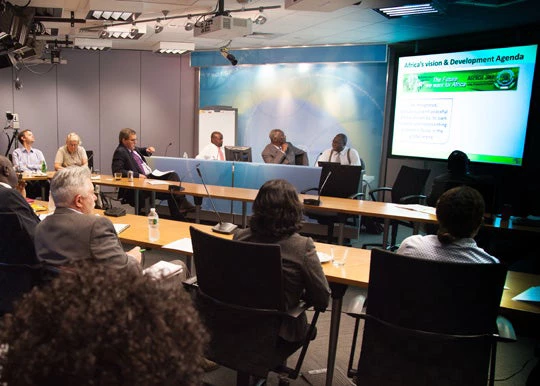History shows that investments in agriculture can be a catalytic force in the fight against hunger, poverty and malnutrition and a well-performing farm economy can be an instrument for achieving sustained structural economic transformation. Agricultural growth was the precursor to industrial growth in Europe and, more recently through the Green Revolution, in large parts of Asia and Latin America. The Green Revolution bypassed Africa.
When I was elected President of the Republic of Ghana in 2000, agriculture was a mainstay of the nation’s economy, accounting for 35% of its GDP, 55% of employment and 75% of export revenues. But it was a lagging, orphan sector, suffering from decades of neglect and lack of investment. Ghana’s agriculture had sadly changed little from the kind practiced generations ago. Farmers were still eking out a living, tilling the land by hand, much like their ancestors.

Photo credit: A’Melody Lee
The plethora of challenges confronting Ghana’s agricultural sector are well known. Crops were overwhelmingly rain-fed. If the rains failed – a hazard that is becoming all too frequent due to a changing climate – the crops withered, pushing farmers deeper into penury. Even if the rains came at the time and intensity expected, pests and diseases decimated harvests. There was minimal use of pesticides, fertilisers or machinery. The same crops were grown year after year, robbing the soil of its fertility.. Declining export revenues were used to pay for food imports, which only helped to drive down prices for our own crops. This forced families to exit farming or worse still, resort to slash-and-burn agriculture, causing severe and lasting damage to our environment. Sadly, these set of issues ailing Ghana’s farming sector are common across the continent.
At that time, as government, we made a deliberate decision to put agricultural transformation at the heart of our ambitions to transform and tackle poverty on a war footing in our country. We did not just talk the talk, we walked the walk.
Ghana was already the second biggest exporter of cocoa in the world. But we believed that by adapting the latest knowledge from universities, agricultural institutions and experts we could greatly increase yields. Cocoa farms were sprayed with pesticides free of charge. Subsidies were provided for fertilisers. Capital investment was made easier and we made sure that credit was cheaper to obtain.
We also ensured farmers were going to be rewarded for their hard work and would keep a larger share of export prices. The results were startling. Between 2002 and 2005, per hectare cocoa production doubled, boosting national production from 350,000 tons in 2001 to 734,000 tons by 2005 – the highest level achieved in over 100 years of cocoa farming in the country.
These improvements were not restricted to cocoa, important as the crop is to the country’s future. Using the same techniques and an abiding commitment to mobilize science, technology and innovation, cereal production increased by 37 per cent between 2000 and 2008 – compared to just 1.9 per cent between 1993 and 2000. We are proud that Ghana – seven years ahead of schedule - became the first African country to meet its MDG target of halving poverty. We also transitioned to coveted middle-income status. Ghana is now widely seen as a beacon of democracy and stability on our continent. This stability has undoubtedly been strengthened by the progress made in agriculture.
It is my fervent hope that Ghana’s experience offers valuable lessons for African countries grappling with underperforming agricultural sectors. The key lesson emerging from our efforts is that success depends on several mutually-reinforcing actions that must be carefully selected to produce the desired impact. These must be backed by a sustained commitment to implementing tough actions and building the capacity -- both human and institutional -- to implement reforms. Looking ahead, Africa like every developing region is faced with the challenge of increasing production in order to meet the food and other material needs of a growing population. Africa needs to increase the productivity of its agriculture and other natural resources, and to add value to its primary products. African-owned and internationally-supported efforts such as CAADP and the Science Agenda for Agriculture in Africa are notable, positive examples.
In late 2013, FARA invited me to join a high-level advocacy panel (HiLAP) of 13 eminent Africans committed to mobilizing and deploying science and technology to drive the transformation of African agriculture. I readily accepted to be part of FARA’s HiLAP initiative because I am convinced that mobilizing science for agriculture is the key to accelerating Africa’s transformation.
I am delighted to have the opportunity of visiting the World Bank where I have shared my optimism and hope for a bigger push needed to improve Africa’s farming sector. Transformation of Africa’s agriculture through science, technology and innovation is the key to realizing a vision of a peaceful and prosperous Africa in the 21st century.


Join the Conversation